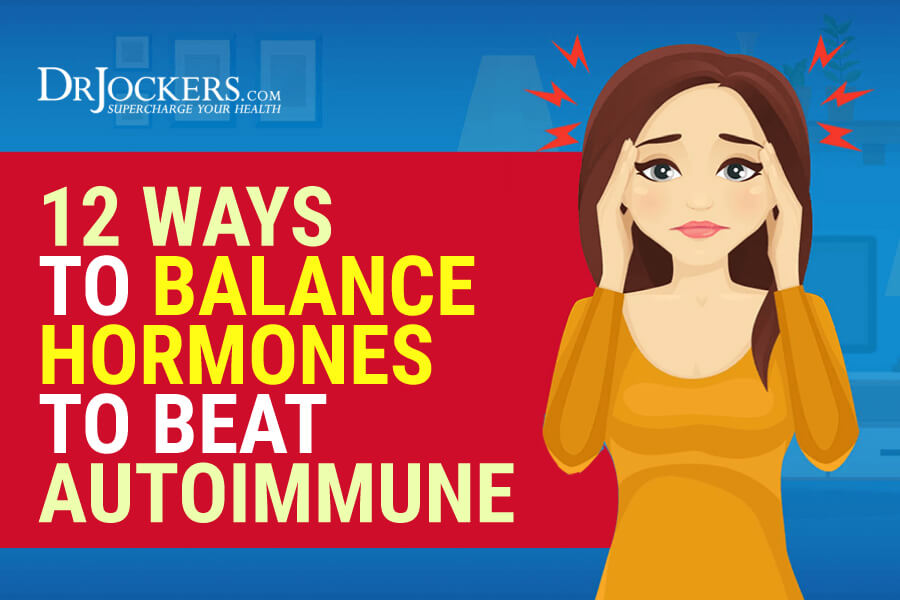 12 Ways to Balance Hormones to Beat Autoimmune
12 Ways to Balance Hormones to Beat Autoimmune
Working to balance hormones may be one of the most important things you can do to improve your health. The opposite, hormonal imbalance, is one of the major root causes of autoimmune conditions. These microscopic messengers of the endocrine system perform a big function when it comes to maintaining your health and well being.
Secreted by various glands (the pituitary, thyroid, adrenals, etc.), hormones signal numerous vital processes in the body, including regulating appetite, sex drive, and sleep. When your hormones are in harmony, you have energy, you sleep better, your weight is in check, and your mood is good. But too much or not enough of even one hormone can throw the whole thing off balance and leave you more susceptible to chronic illnesses, including autoimmune conditions.
If you have decreased energy, brain fog, moodiness, or trouble managing your weight, you may be one of the millions of Americans in a state of hormonal imbalance. And if you’re a woman, you’re three times more likely to develop an autoimmune disorder — although men certainly experience hormonal imbalance too.
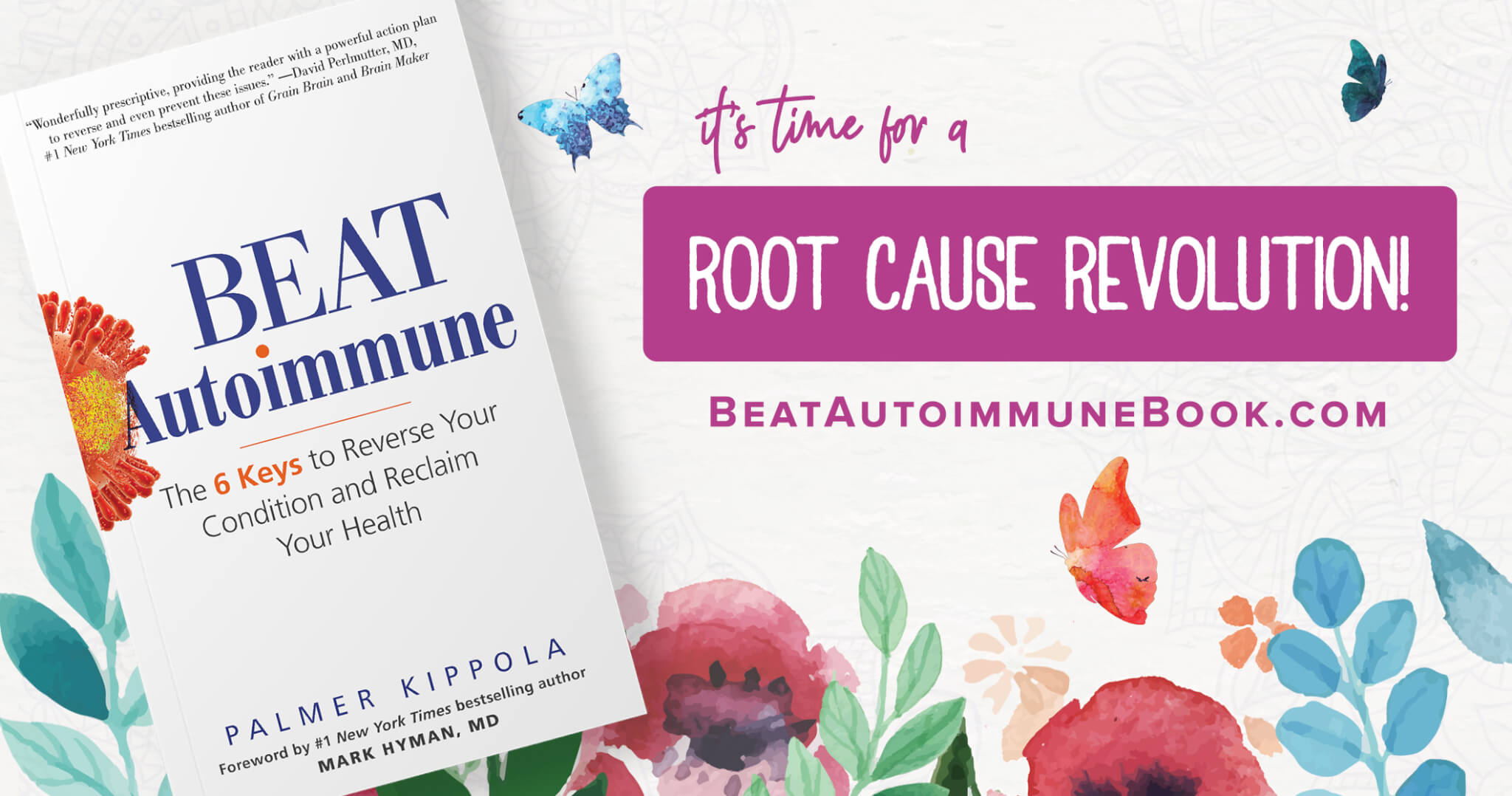
The Beat AutoImmune Book
The following is an adapted excerpt from Beat Autoimmune, The 6 Keys to Reverse Your Condition and Reclaim Your Health, by Palmer Kippola, with a foreword by Mark Hyman, MD (Kensington Books). Palmer is a Functional Medicine Certified Health Coach who reversed her MS by removing her inflammatory root causes and healing her gut.
She has created a framework for healing and preventing autoimmune conditions called F.I.G.H.T.S.™ which represent the root cause categories we can control: Food, Infections, Gut health, Hormone balance, Toxins and Stress. This excerpt focuses on one of the 6 keys: Hormonal balance. You can get her book here and then all her free bonuses when you enter your order information here
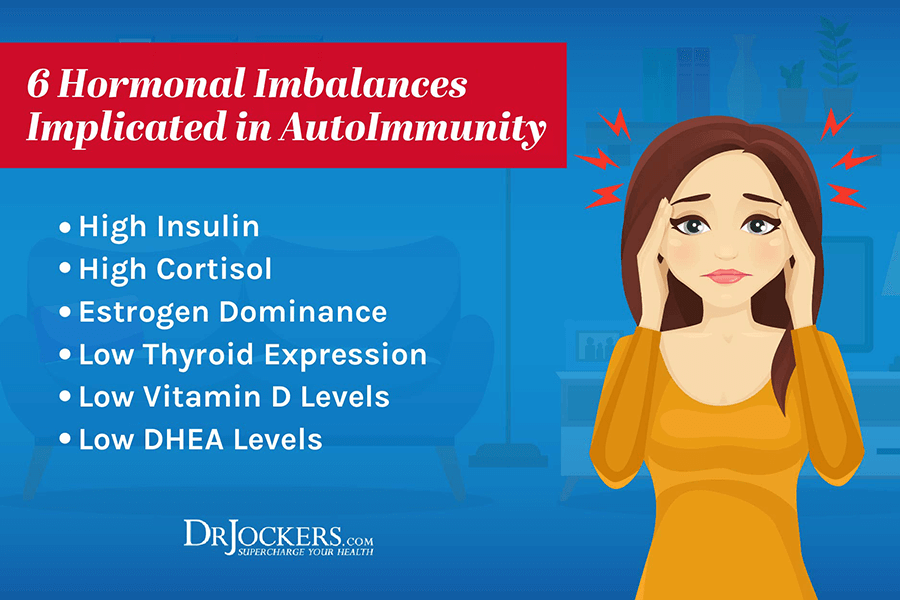
6 Hormonal Imbalances Implicated in Autoimmunity
Dozens of hormones course through our bodies, but there are six major imbalances that contribute to autoimmune and other chronic diseases. Although it’s not uncommon to have a combination of all six, the good news is that these imbalances are mostly in our control.
High Insulin – aka “Insulin Resistance”
Excess sugar, a hallmark of the Standard American Diet (SAD), is the main factor contributing to high insulin. The pancreas produces insulin to tell your cells to take up sugar; the more sugar you consume, the more insulin is created. Eventually, your cells hit max capacity and stop responding to the insulin. Since your body has nothing to do with the excess sugar, it stores it as fat — say hello to your annoying and potentially dangerous spare tire.
Symptoms: fatigue (especially after eating), cravings for sweets, weight gain in the abdomen, weight loss resistance, frequent urination, aches and pains, and dark patches on the skin.
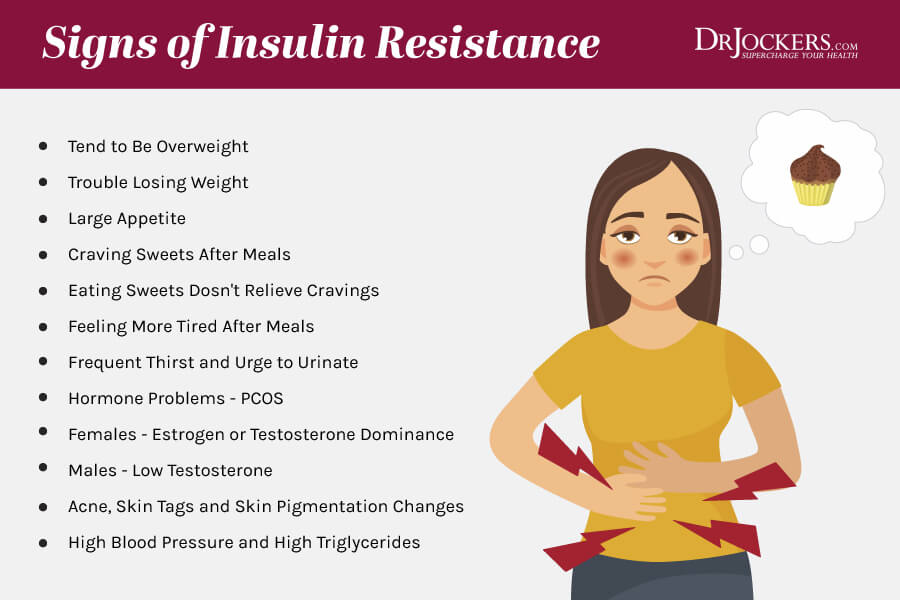
High Cortisol
Stress does to cortisol what sugar does to insulin: a little bit is okay, but too much sends your body spiraling. Humans were made to deal with stress and even thrive from it in small doses.
But for many people, stress has become such a regular part of life that our bodies are producing way more cortisol than we need, leading to a catabolic state (i.e. the body begins to break down faster than it can build up.) Eventually, your cells will become resistant to cortisol and levels will flatline.
Symptoms: feeling tired but wired, anxiety, heart palpitations, trouble sleeping, salt and sugar cravings, dizziness upon standing, and low blood pressure.
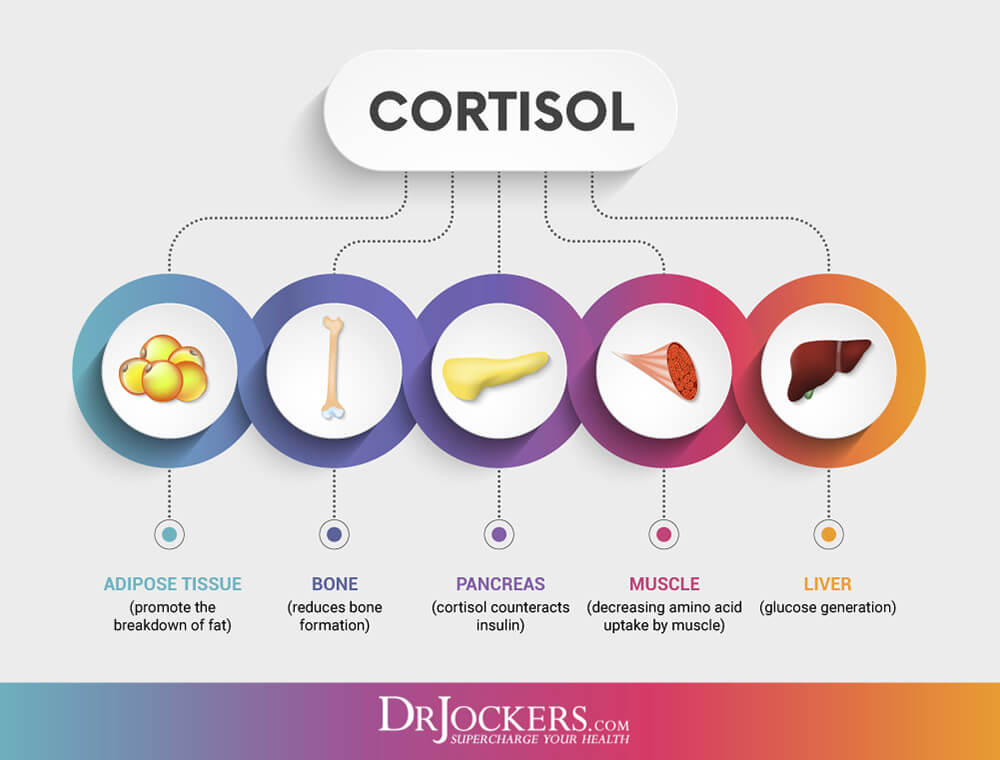
Estrogen Dominance
Defined as too much estrogen in relation to progesterone in women and too much estrogen to testosterone in men, estrogen dominance is frequently caused by two modern-day factors:
1. Chronic stress, which creates high cortisol levels leading to the depletion of progesterone, and
2. Artificial estrogen in the environment, found in Bisphenol A (BPA), phthalates, and parabens, as well as birth control pills and synthetic hormone replacement therapy (HRT). Even conventional cow dairy loaded with growth hormones and steroid hormones can introduce extra estrogen into our bodies.
Symptoms in women: menstruation with heavy bleeding and severe cramps, increased PMS symptoms, weight gain in hips and butt, ovarian cysts, endometriosis, fibroids, migraines, miscarriages, rosacea, insomnia, brain fog, anxiety or depression, decreased libido, and gallbladder issues.
Symptoms in men: fatigue, loss of muscle mass, urinary tract issues, reduced libido, erectile dysfunction, anxiety or depression, increased belly fat, and enlarged breasts.
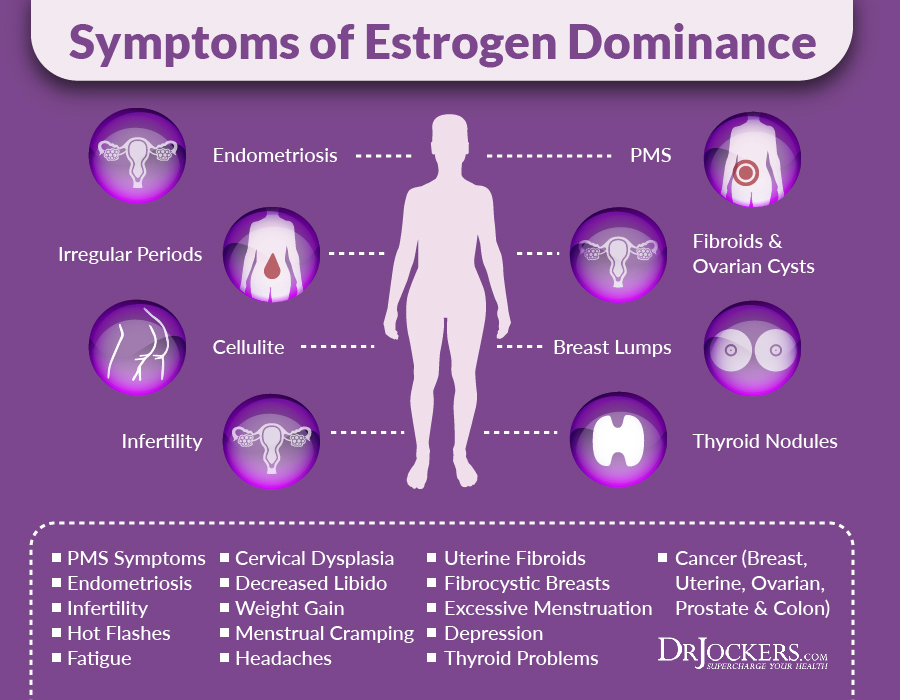
Low Thyroid
Hypothyroidism is one of the most common hormonal disorders, causing your body’s metabolic system to slow, leading to feeling sluggish, tired, and cold, and a number of bigger issues, including depression, infertility, and autoimmune problems. Up to 90% of people dealing with hypothyroidism actually have an autoimmune condition called Hashimoto’s thyroiditis, in which the immune system inadvertently attacks thyroid tissue.
Symptoms: weight gain or weight loss resistance, hair loss (including the outer third of your eyebrows), poor concentration, brain fog, constipation, tiredness upon waking, cold intolerance, depression or anxiety, joint aches and pains, and dry skin, hair, or nails.
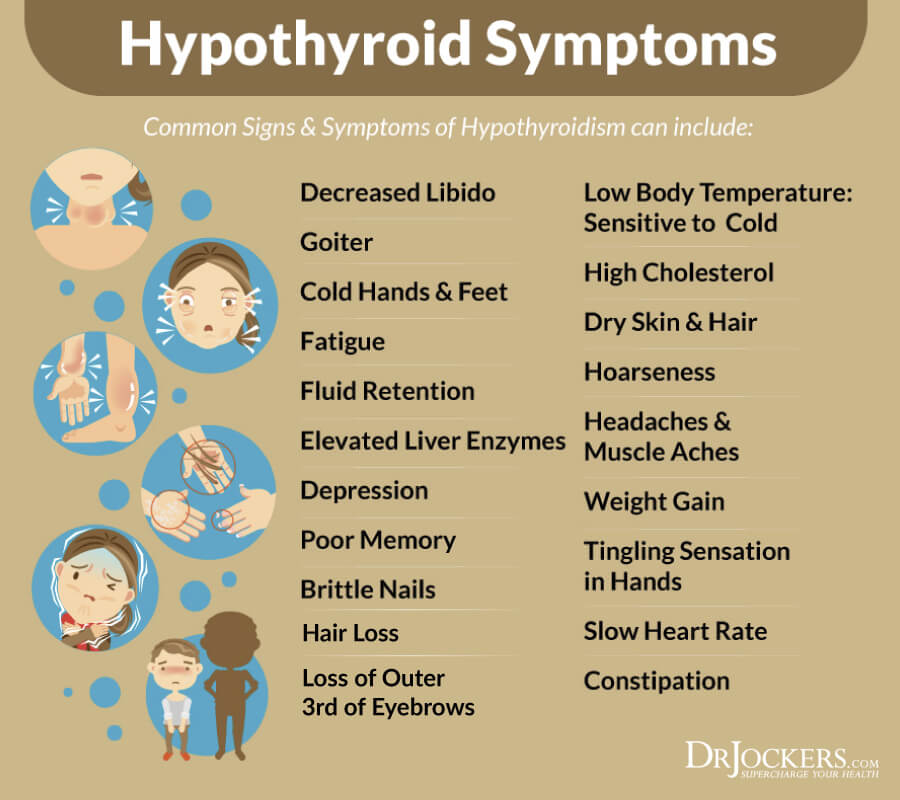
Low Vitamin D
Many factors can contribute to vitamin D deficiencies, including age (over 65); darker skin pigmentation; limited sun exposure; and in some cases, a genetic mutation in the D receptor site genes, called VDRs. In addition to its connection with autoimmune conditions, low vitamin D is linked to cardiovascular disease, cancer, and dementia.
Symptoms: fatigue, aches and pains, weakness, frequent infections, osteopenia, osteoporosis, bone pain, and bone fractures.
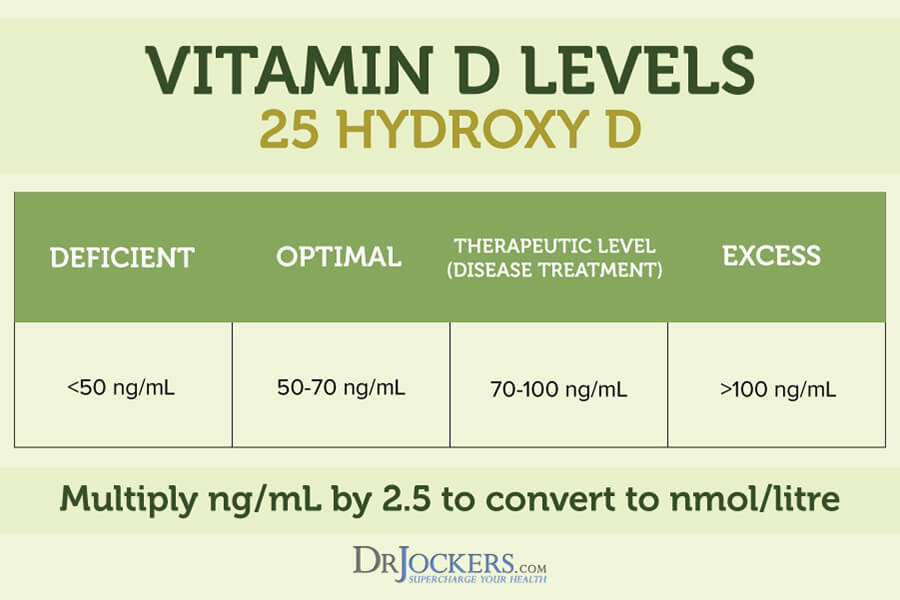
Low DHEA
DHEA naturally begins to decline in your twenties, but chronic stress also contributes to the loss of this foundational hormone. Adrenal glands are responsible for the production of both cortisol and DHEA. When stress is high, your adrenals work on over time to make cortisol. When they become depleted, DHEA also goes down, compromising the body’s immune system and accelerating the aging process.
Symptoms: profound fatigue, decreased stamina and alertness, aches, weakness, malaise or depression, reduced muscle mass and bone density, thin skin, low libido, frequent infections, dry skin and eyes, poor memory, and weight loss resistance.
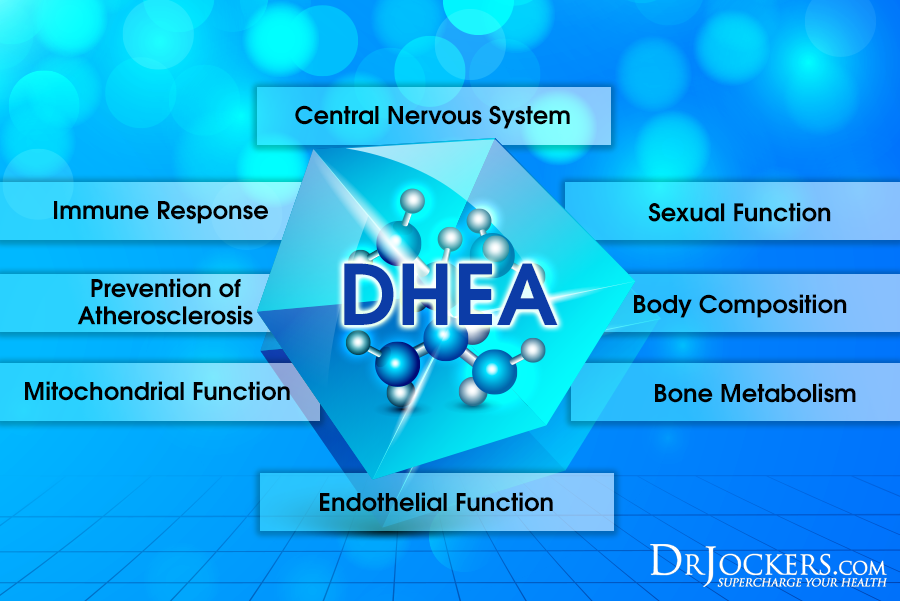
What You Can Do to Balance Hormones Today
If you have an autoimmune condition or any of the symptoms listed above resonated with you, your hormones could probably benefit from better balance. The only way to know for sure is to get tested, and ideally, work with a practitioner experienced in natural hormone balancing.
In the meantime, these twelve lifestyle strategies will give you a leg up in achieving hormonal harmony:
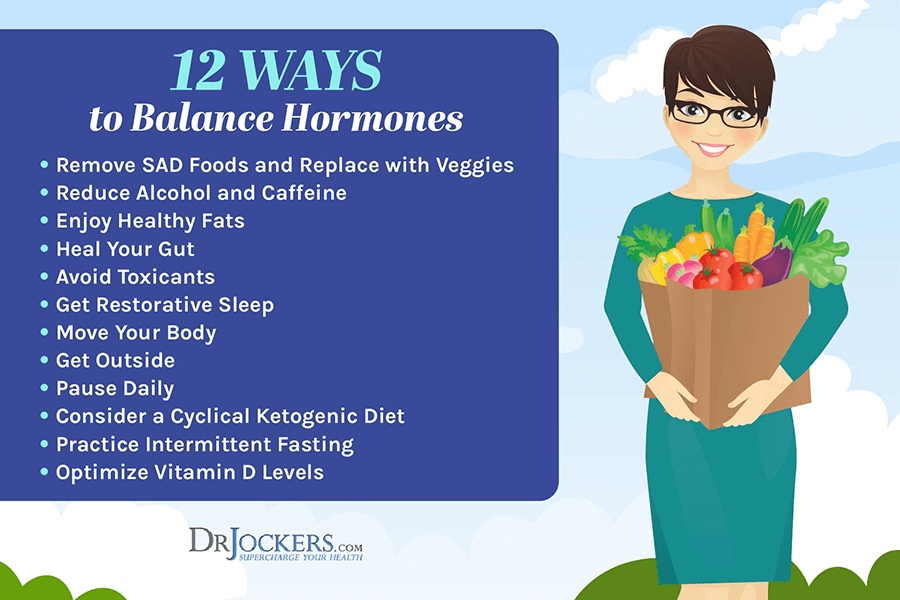
Remove SAD Foods and Replace with lots of Veggies and Fiber
Sugar in all forms, processed grains, and starchy carbohydrates promote insulin resistance. Researchers have found that for every 150 calories of added sugar per day—about one can of soda—the risk for diabetes goes up about 1%. (1) Conventionally grown, pesticide-laden produce, commercially raised meats, poultry, and dairy products promote estrogen dominance.
On the other hand, leafy greens (e.g., kale and spinach), cruciferous vegetables (e.g., broccoli and Brussels sprouts) and sulfur-rich vegetables (onions and garlic) promote healthy liver function and help clear harmful estrogen metabolites (2), while fiber feeds your beneficial gut bacteria, which can help optimize thyroid function and improve insulin sensitivity. Fiber also reduces estrogen dominance by helping to safely excrete excess estrogen from the body.
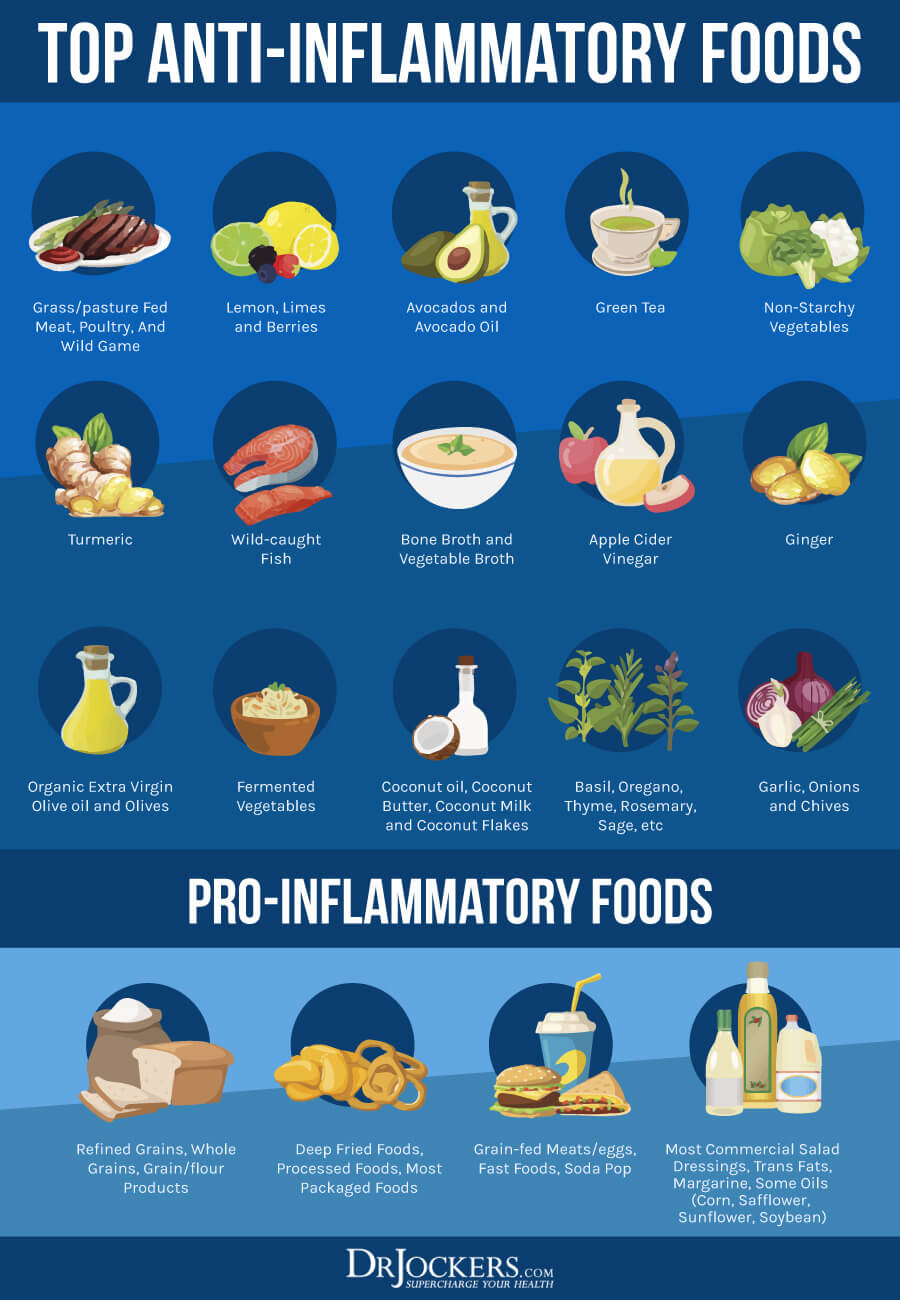
Reduce Alcohol and Caffeine:
Alcohol promotes estrogen dominance and significantly raises breast cancer risk. A 2015 study revealed the risk of breast cancer goes up 60% with each daily 5-ounce glass of alcohol. (3) Studies have shown that caffeine spikes cortisol, raises insulin, and may even elevate estrogen.
A clinical trial of 500 women showed that women who consumed 500 mg of caffeine daily—the equivalent of four or five cups of coffee—had nearly 70% more estrogen than women who consumed less than 100 mg of caffeine a day. (4)
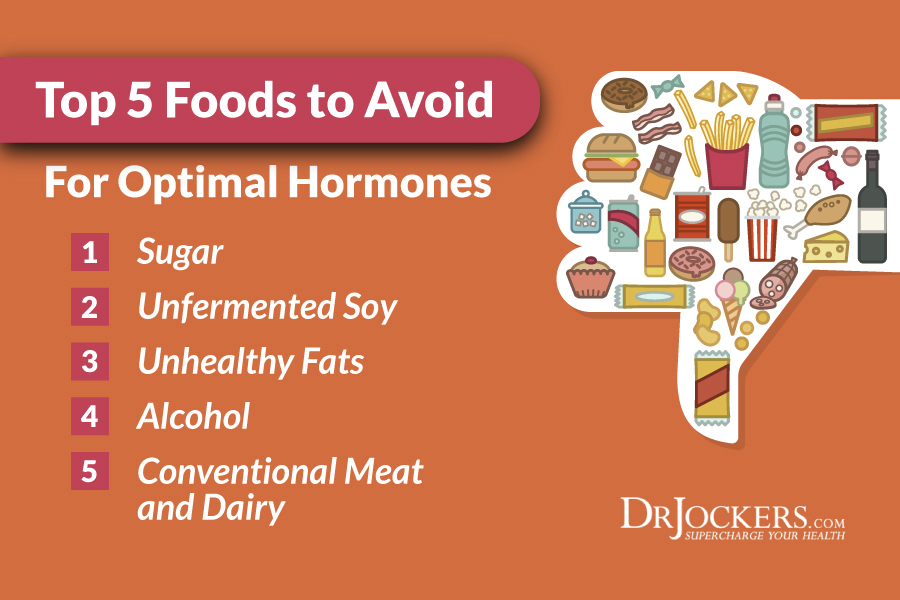
Enjoy Healthy Fats:
Despite the sugar industry’s best attempts to convince us otherwise, saturated fat, omega-3 fats, and cholesterol are essential for health and are the foundational building blocks of hormones, cell membranes, and brain health.
Replace processed vegetable oils with healthy saturated fats like coconut oil, ghee, and lard from pasture-raised animals; and increase consumption of omega-3 fats like wild salmon, 100% grass-fed animals, flax seed, and walnuts. Other nourishing fats include extra virgin olive oil, hemp and flax seed oils, nuts, seeds, and avocados.

Heal Your Gut To Balance Hormones:
Probiotics (supplements and fermented foods) and prebiotics (fiber found in vegetables, flax, and chia seeds, and supplemental powders like psyllium husk, acacia, and inulin) help balance your microbiome, which in turn helps with overall hormone balance, including optimizing thyroid function, lowering cortisol, increasing serotonin production, and even raising vitamin D levels. (5)
It may also be wise to take things like digestive enzymes with your meals to take stress off of the gut and the digestion process. For many individuals, replacing a solid food meal with a high quality protein shake can also reduce stress on the intestinal lining and improve gut function.
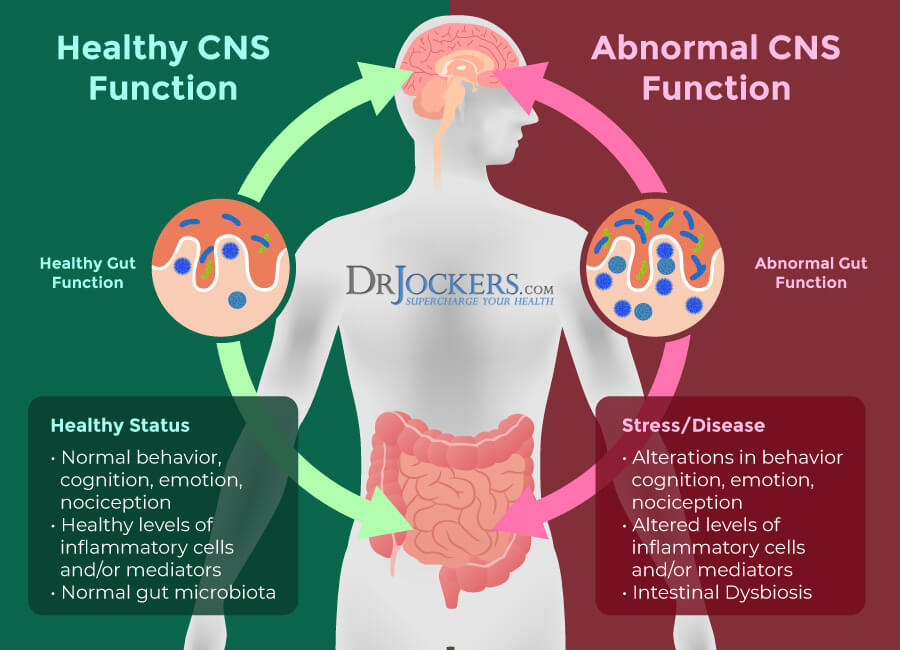
Avoid Toxicants:
Do all you can to keep your home and body toxin-free. Use EWG’s Skin Deep® or the Think Dirty® app to scan your body care products and determine which to keep and which to toss.
Dispose of all chemically based cosmetics, body care products, house cleaners, and pesticides at a local chemical waste drop-off facility; replace plastic storage containers with glass; swap plastic water bottles for stainless steel or glass; and filter your water for drinking and showering.
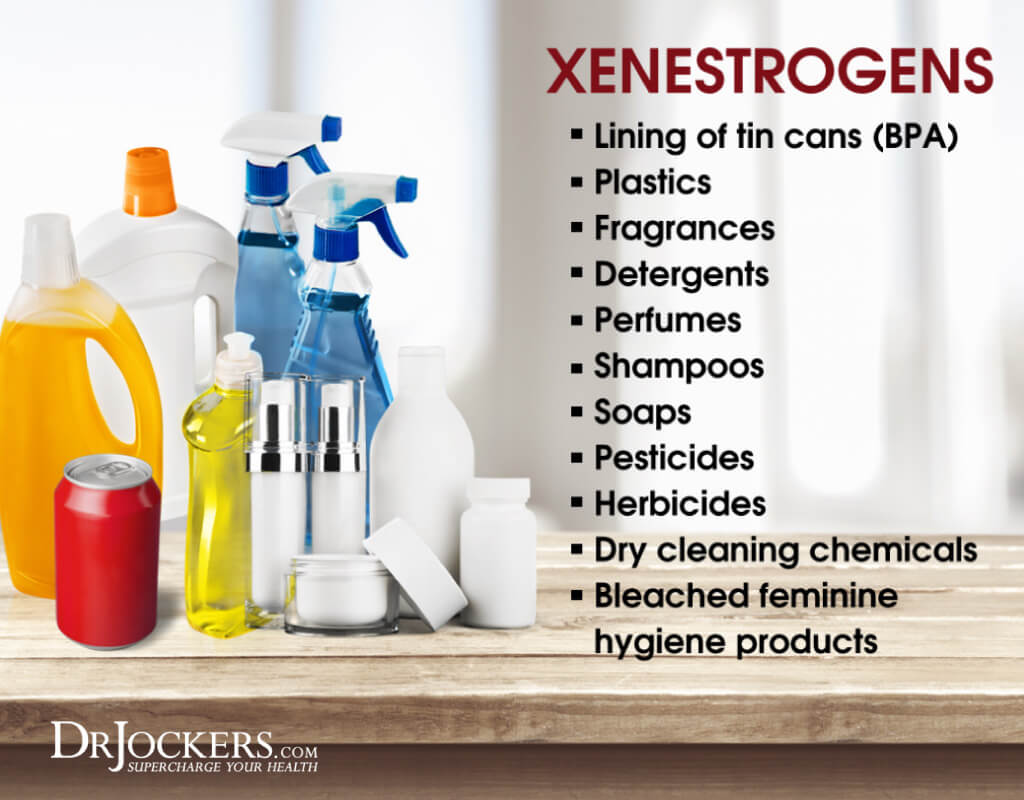
Get Restorative Sleep to Balance Hormones:
Make it a priority to get eight or more hours of high-quality sleep each night to balance your hormones and keep extra weight off. Accumulating evidence indicates that chronic sleep deprivation—defined as less than seven or eight hours a night—causes hormonal imbalance including elevated insulin levels, increased nighttime cortisol, increased levels of the hormones that increase your hunger (ghrelin) and appetite (leptin). (6)
If you are struggling with poor sleep, there are many things you can do to improve it. Read this article to discover the main factors causing you to sleep poorly and strategies you can apply today to improve your sleep quality.
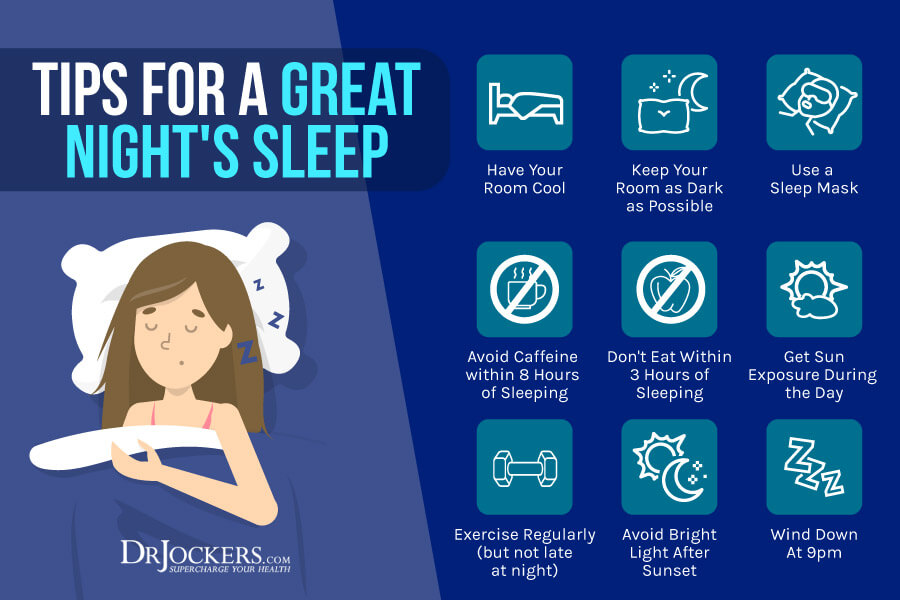
Move Your Body to Balance Hormones:
Whatever form you choose, exercise can help balance your hormones—with one big caveat: If your adrenals are depleted with high or low cortisol, pass on the high intensity and endurance varieties in favor of gentle movement like easy walks, swims, or bike rides.
Consider yoga or tai chi, which help to lower cortisol levels, reduce anxiety, and promote the brain-calming neurotransmitter, GABA. If your adrenals are up for it, burst training, also called high intensity interval training (HIIT), improves insulin sensitivity and increases human growth hormone (HGH).
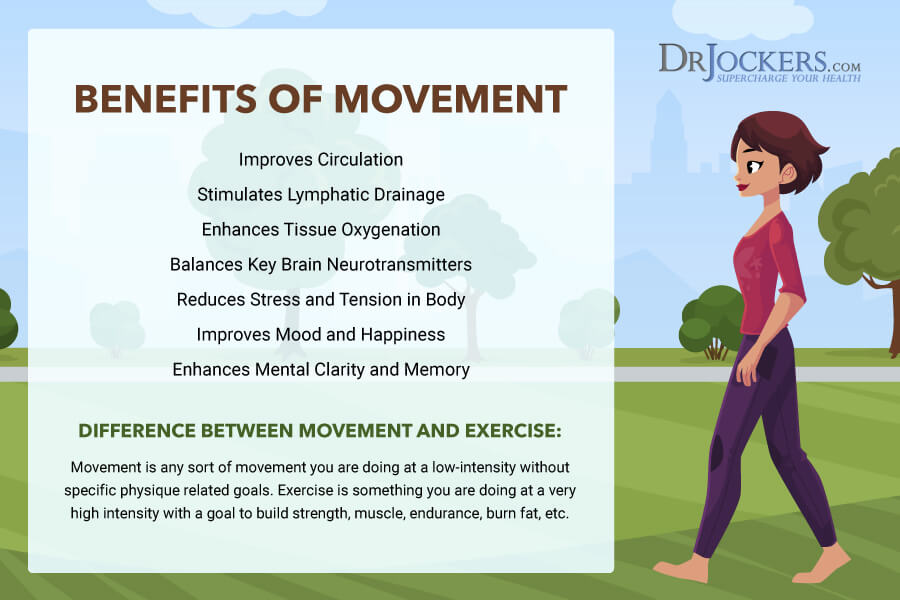
Get Outside To Balance Hormones:
Whenever you can, get out in nature for a walk, a hike, or just to sit. Morning sunlight especially, has been shown to help regulate your hormones, support brain function and mood, help you sleep better at night, and calm the stress response.
When possible, go barefoot—on pesticide-free grass—to benefit from grounding (also called Earthing), which has been shown in studies to lower cortisol and lower stress. (7 – 8)
Pause Daily:
Make time to pause and move into the “rest and digest” healing state for just twenty minutes a day to help lower cortisol and improve sex hormone production.
Incorporate stress-relieving strategies, like conscious breathing, meditating, prayer, dancing, yoga, listening to soothing music, or soaking in a hot Epsom salt bath with a few drops of lavender or ylang ylang oil, to help lower cortisol.
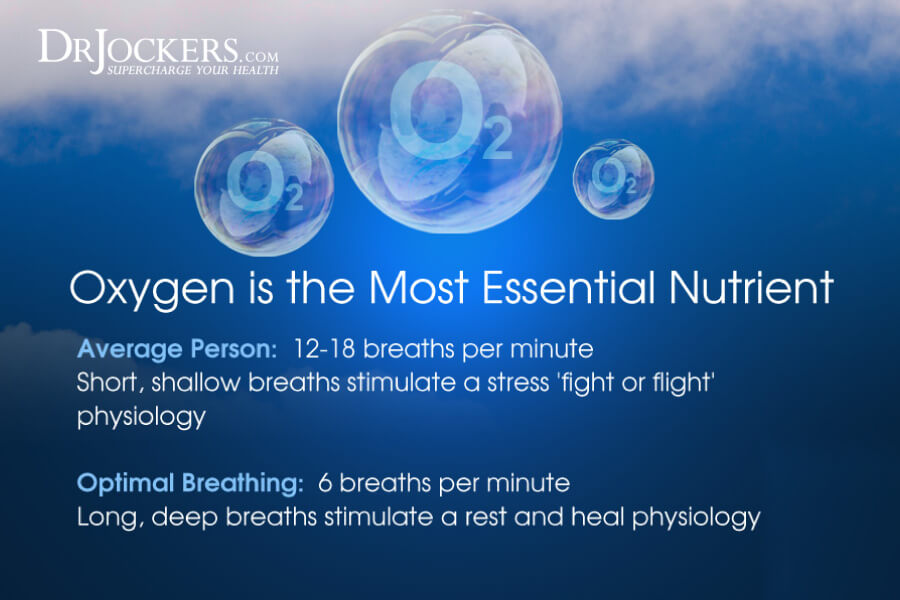
Consider a Cyclical Ketogenic Diet:
Periodically following a ketogenic diet that emphasizes vegetables and healthy fats, some meat, poultry, and fish, and restricts carbohydrates can be especially helpful in balancing hormones for peri- and menopausal women. On a ketogenic diet, you avoid sugar and starch and keep your net carbs (total carbs – fiber) very low and replace those calories with healthy fats.
A cyclical ketogenic diet would mean that you go through periods of time where you are in ketosis but you will also strategically increase your carb intake from time to time. This can be very helpful for reducing inflammation and optimizing hormone sensitivity. Here is a helpful article on how to follow a cyclical ketogenic diet.
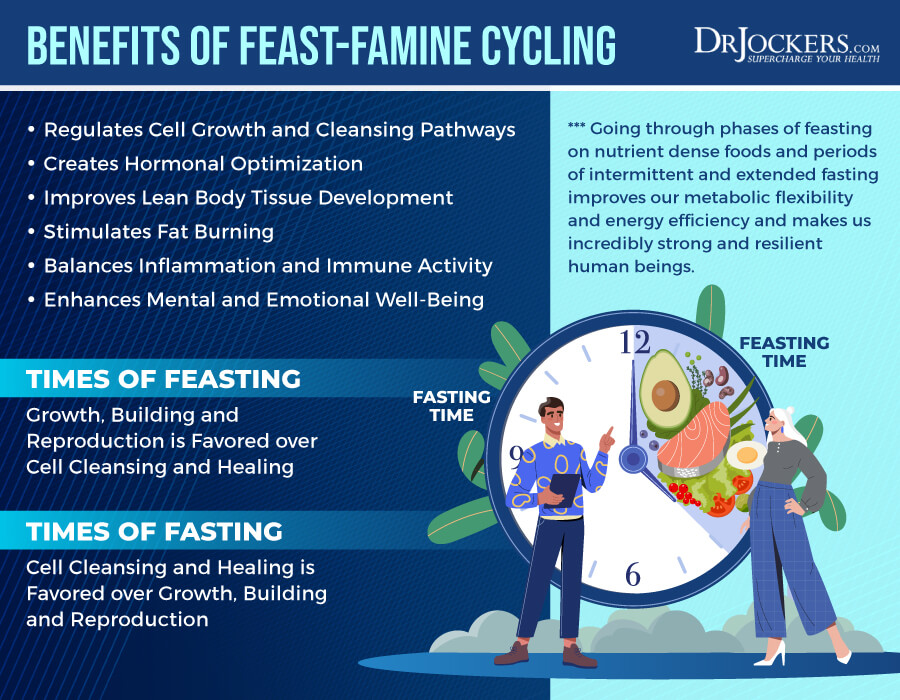
Practice Intermittent Fasting (IF):
Studies confirm that intermittent fasting, which can be defined as going without food periodically, has numerous health benefits like improving insulin sensitivity, boosting metabolism and energy levels, and reducing the risk of diabetes, cardiovascular disease, cancer, autoimmune conditions, and Alzheimer’s. (9)
Consider allowing fifteen hours between dinner and breakfast a few times per week. Or try skipping dinner a few times a week, and just eat breakfast and lunch. If you struggle with adrenal fatigue and autoimmunity, I typically recommend using a crescendo fasting which you can learn about here
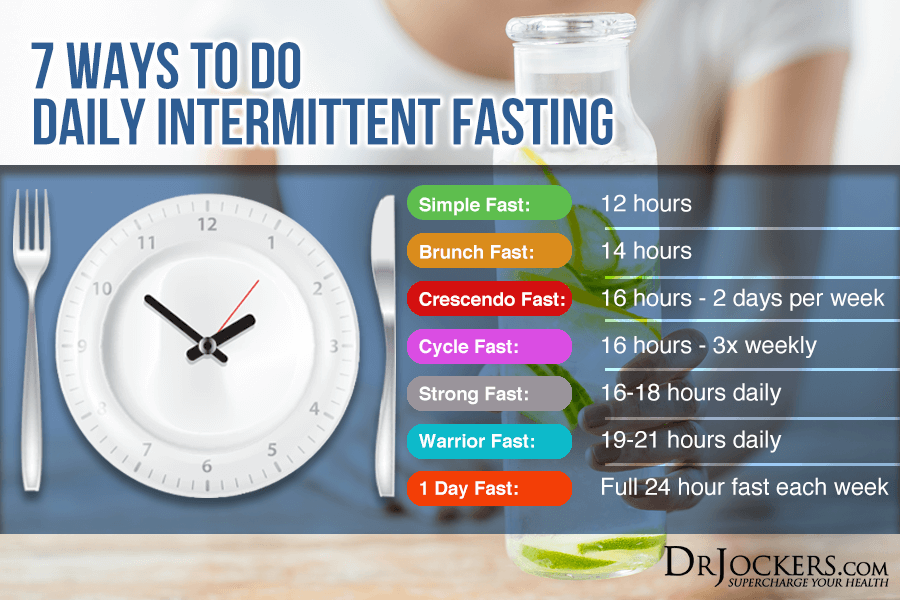
Optimize Your Vitamin D Levels
As discussed earlier, vitamin D is so critical for a healthy hormonal and immune response in the body. Most people in society are vitamin D deficient because we live indoors and are not getting daily sun exposure.
Try to get 15-45 minutes of good quality sun exposure daily or at least 2-4 times per week on a large part of your body (laying out in a bathing suit) if possible. The lighter your skin the less sun exposure you will need and even 10-15 minutes may be enough. The darker your skin the more exposure you need to produce adequate vitamin D and this may be up to 45-60 minutes 3-4 days a week.
During the colder months of the year be sure to supplement with a high quality vitamin D3 supplement that also contains vitamin K2. A good recommendations is to supplement with 1000 IU per every 25 lbs of body weight. For most adults this will be between 5,000-10,000 IU daily and test your vitamin D3 levels one or more times each year to make sure your levels are in the 50-100 ng/ml range.
Final Thoughts to Balance Hormones
Hormones may be a complex and challenging arena, but they can also be a richly rewarding one, once dialed in. The key to hormonal balance is to live in harmony with nature and stop harming yourself with unnatural elements, which can be summed up in two words: sugar and stress.
Get Your Free Gift. “Palmer Beat Autoimmune” and you can too! Do you have an autoimmune condition or are you struggling with mysterious symptoms? Healing starts with what you eat. Click here for a complimentary copy of Palmer’s Optimal Food Guide which will help you identify your trigger foods, discover your optimal foods, and embrace healthy food habits for life! Access it now.

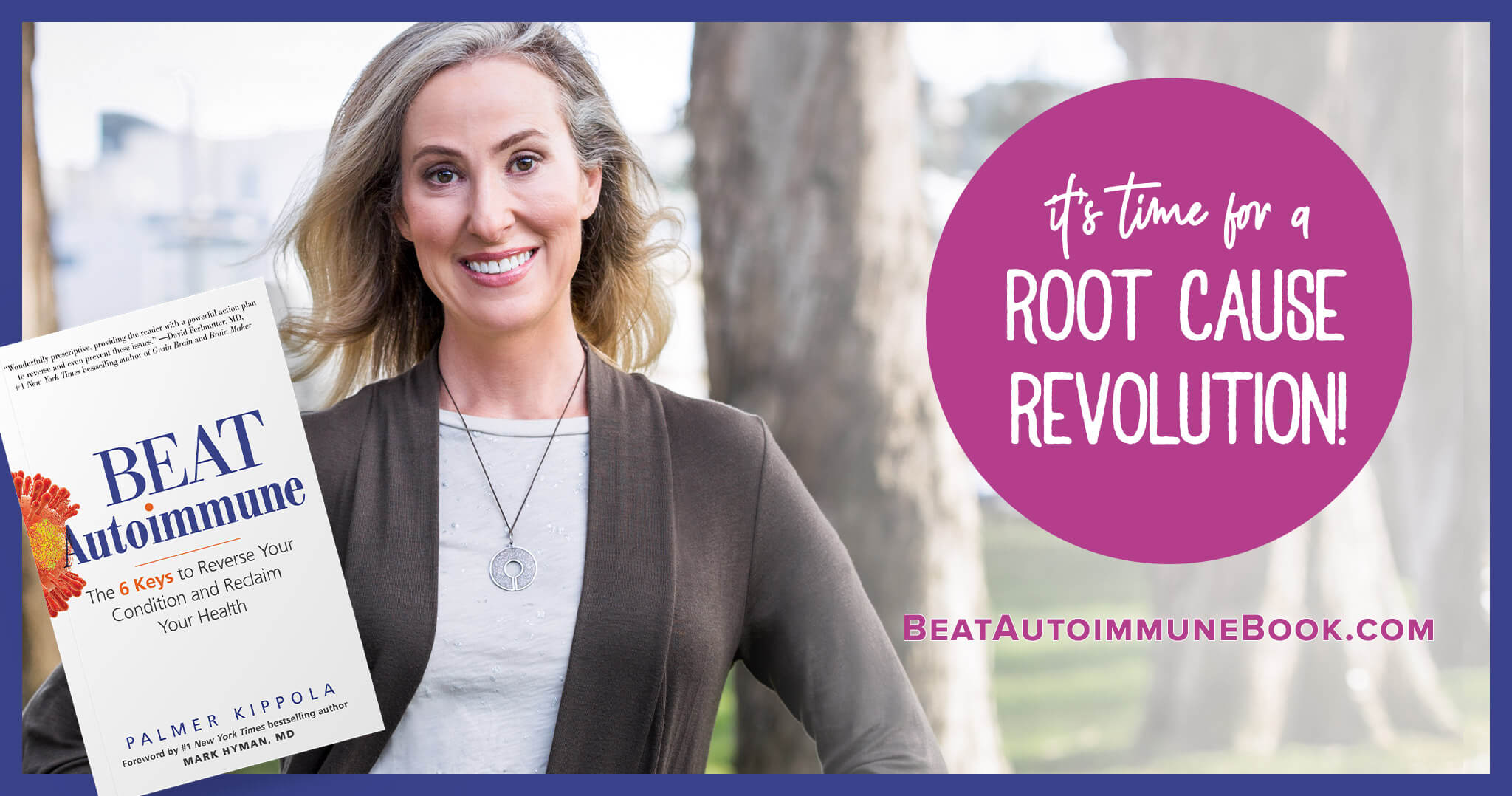



Helpful article, I’ll pass this on to my daughter, who’s always been “hormonal” !
Thanks Nora!
Thanks Dr. Jockers. So many things I have been studying for years.
After having an unknown sourced bacterial infection stapplicocus gordini at age 50 everything was fine. After 6 weeks x 3 times per day of antibiotics 5 years ago things
started going weird. What “doctors,” dont tell you is how to handle once the antibiotics stop. Again, you have to do your own homework. I knew doing this treatment for a larger than usual heart murmur – ie, infection not wanting to get to my mitral valve regurgitation.
Heart doctor inssisted we do the 6 weeks – after 3 days of 2 types of antibotics I felt great.
Then 6 weeks with a pik line in my arm x 3 times per day. Just like to warn everyone to do your homework about antibiotics treatments –its not what they do, but how to
recover the causes of more problems AFTER the treatments –it takes years [and I am still not 100%) I do coconut pulling, fermented foods [i make my own – its easy], and although not a perfect diet avoid a lot of things Dr. Jockers mentiond. Even olive oil you buy may not really be 100% olive oil — avoiding Italy, Portugal, Greece. Try California, Australia, or Northern Africa olive oil as these are less likely mixed with another bad oil –but you” never know it. I read this from several online sources. ALso watch anything frozen or boxed for hidden MSG [sometimes hidden in the word “broth”] Ramen noodles –chocked full of this stuff, as are many canned soups — which I don’t touch either.
Keep in mind some changes in diet and sound supplements take time to work — Don’t expect “instant” results – like we are all trained to getting. [after 2-3 days don’t think it doesn’t work — give things time] You will get overwhelmed with the amount of good things and changes. Take small steps to changes. It may seems everything is OFF the menu — and it almost is –everything is bad for you comes in to your mind. Realize no one is perfect [on this earth] and base it on how you feel after changes – but give it time. All this for what its worth. Thanks Dr. Jockers – for this very good and complete summary.
I have still many of things still happening –I realize everyone is different how things affect them –the mind being the most powerful. All the best!
Hi!
I am so sorry that you have had to go though this. Thank you so very much for telling your story to help others so they may learn and heal. I wish you continued healing and a blessed life!co
Donna
Thank you Donna! Blessings!
Hey Dean, Thank you for sharing! Blessings!
I always wondered how experts expect ppl with hormone/adrenal imbalances get the energy they need to follow their recommendations…they obviously don’t know what it’s like to struggle every day to just get the basics done, let alone such a ridiculously long list of to-do’s.
Hi Dr. Jockers,
Great post. I Have been learning so much from your website. Was curious about intermittent fasting. I often do the cycle fast of 15 to 16 hours 3x a week. however, during that time I do take supplements and my thyroid medication. Is that breaking my fast and interfering with my digestion? Any advice would be great.
Thanks,
Amber
Wow!! This is so interesting!
I’ve started taking the pill about 18 years ago (I’m currently 38). 2 years later I was diagnosed with hypothyroidism. Since then I’ve been taking thyroid hormones.
However, it’s not Hashimoto.
A few years later I was diagnosed with Crohn’s disease, although I’ve never had any typical symptoms or a flare-up – luckily.
For 4 years I’ve been struggling with permanent (24/7) bloating. I look extremely pregnant. I’ve always been slightly underweight, so the belly pops out even more under these circumstances.
For 2 years I’ve had permanent burping. I’m just belching up air. I’m not swallowing too much air, though. Several examinations have shown that the PH level in my stomach is normal. It’s no reflux, no fluid, no food coming back up, just air.
6 years ago I was diagnosed with an unterine fibrom. It was very small (about 1 cm) back then. Recently it has grown to now be over 5 cm. And for about a year it has caused my period to go into an chaotic state. I’m literally bleeding all the time and on some days so much that I had once to go to an emergency clinic.
All of this sounds like most of my hormones are completely out of balance and now I also see that it’s all somenow connected.
I’m already eating a very healthy diet (due to my Crohn’s disease). I’m also performin intermittent fasting daily (16:8) while eying my weight closely. Like I said I’m already underweight, so I need to be careful.
My vitamine D levels were insanely low (5 ng/ml), but I’ve been supplementing for a year now and the last check up revealed I’m in the healthy region now (over 60 ng/ml).
My biggest concern is the fibrom at the moment because I really want to avoid surgery if somehow possible. I don’t have kids yet, not sure if I want any, but still …. and in Germany (where I’m from) the laparoscopic morcellator method is very popular … but I know about the risks. It can spread cancerous cells throughout your body, so no thanks.
I first want to try if I can get my hormonal imbalances back into check before I do surgery. And as it all seems connected, maybe some of my other issues will vanish as well. 🙂
Hi Jasmine, I am so sorry to hear! Working closely with a functional health practitioner can help you customize a specific plan and navigate you through your health journey. I recommend this article: https://drjockers.com/functional-nutrition-tips-to-find-a-great-health-coach/